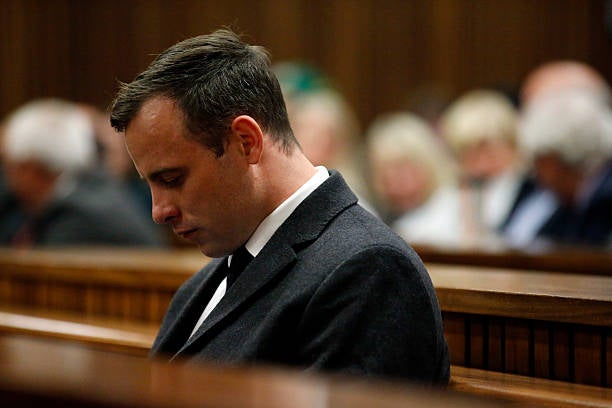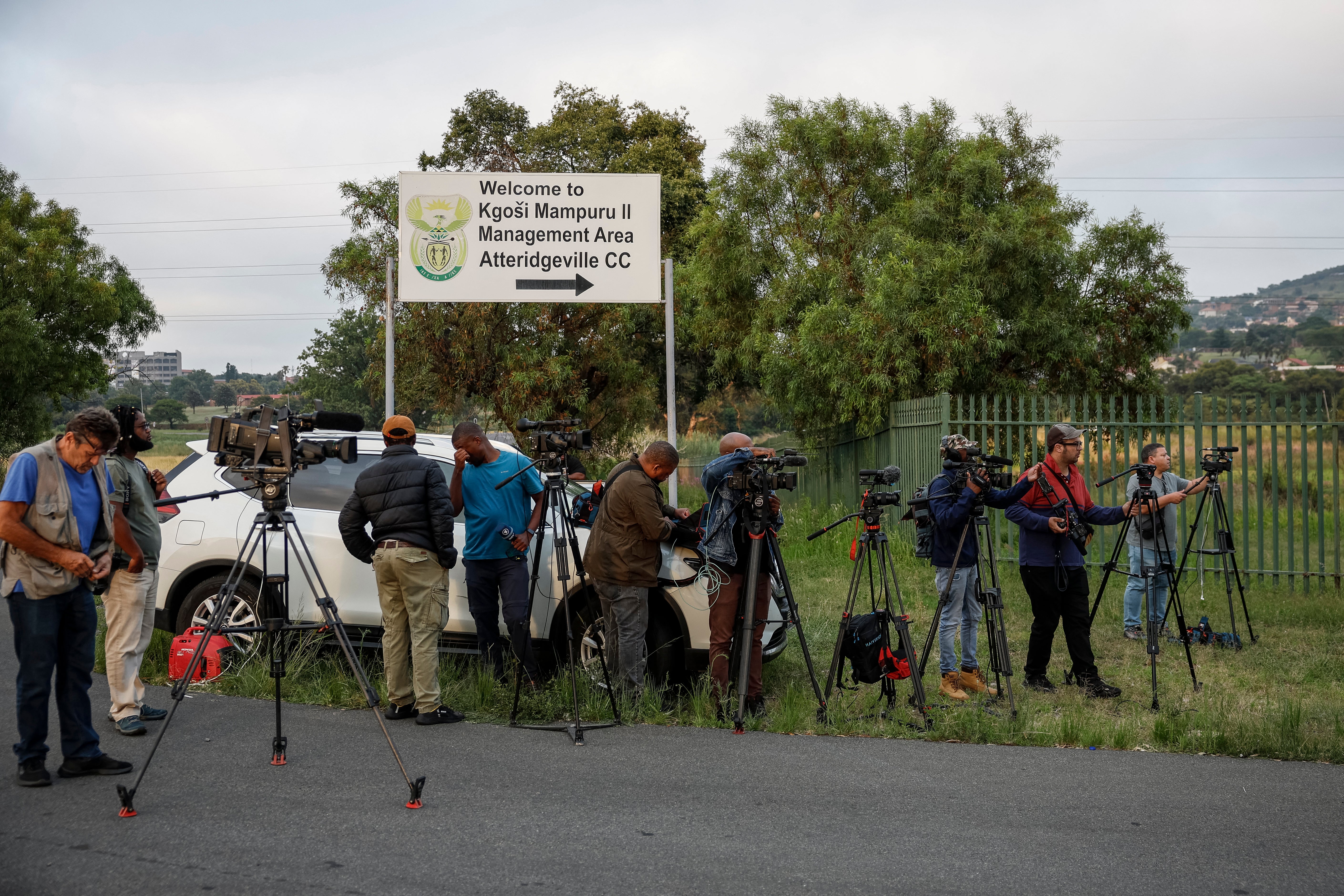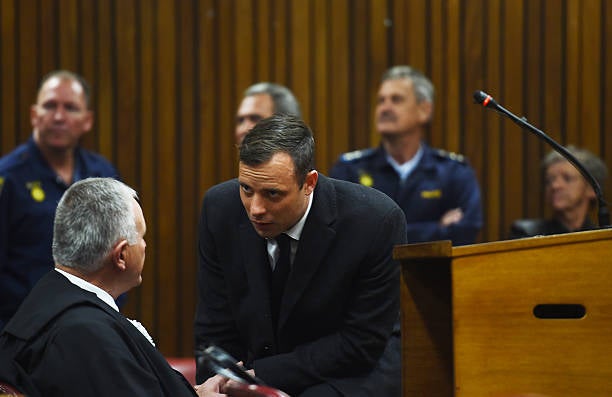Oscar Pistorius released on parole and at home 11 years after murdering Reeva Steenkamp - live
Pistorius admitted to system of community corrections and is now at home
Paralympian gold medalist Oscar Pistorius was freed from a South African prison today, 11 years after he killed his model girlfriend Reeva Steenkamp.
He is admitted to the system of community corrections and is now at home, said South Africa’s Correctional Services Department.
The double amputee was convicted of murdering Steenkamp after he shot her multiple times through a locked toilet door with a 9mm pistol on Valentine’s Day at their Pretoria home in 2013.
Now reportedly a grey haired smoker who has turned to religion, the 37-year-old will begin his new life on parole a few miles away from the South African capital behind the high walls of his wealthy uncle’s guarded property.
Live: View of South Africa prison as Oscar Pistorius released on parole
A gun enthusiast, Pistorius claimed he thought Ms Steenkamp was an intruder but was convicted of culpable homicide - a crime similar to manslaughter - in 2014.
He was found guilty of the more serious charge of murder in 2015 and he was later sentenced to 13 years in prison after prosecutors won an appeal on the grounds his initial sentence was too lenient.
Oscar Pistorius timeline: From Paralympian to prison for the murder of Reeva Steenkamp
Oscar Pistorius has been released from prison nearly 11 years after he killed his girlfriend Reeva Steenkamp.
The former Paralympian went from one of the world’s most celebrated athletes to criminal, ultimately being convicted of Ms Steenkamp’s murder.
Here is a timeline of how we got to this point:
Read the full article from my colleague Tom Watling here

Oscar Pistorius timeline: From Paralympian to prisoner
The South African former athlete has been released on parole to finish his sentence
Campaign group says release sends ‘concerning message'
In a Twitter statement, the campaign group Women for Change, who advocate for the rights of women and children in South Africa, said: “We believe that granting parole to someone convicted of killing another person sends a concerning message about accountability and justice in our country.
“We maintain that Oscar Pistorius should have served his full sentence for the brutal murder of Reeva.”
What are parole conditions imposed on Pistorius
Some of Oscar Pistorius’ parole conditions include restrictions on when he’s allowed to leave his home, a ban on consuming alcohol, and orders that he must attend programs on anger management and on violence against women. He will have to perform community service.
Pistorius will also have to regularly meet with parole officials at his home and at correctional services offices and will be subjected to unannounced visits by authorities. He is not allowed to leave the Waterkloof district without permission and is banned from speaking to the media until the end of his sentence. He could be sent back to jail if he is in breach of any of his parole conditions.
South Africa does not use tags or bracelets on paroled offenders so Pistorius will not wear any monitoring device, Department of Corrections officials said. But he will be constantly monitored by a department official appointed to his case and will have to inform the official of any major changes in his life, such as if he wants to get a job or move house.
What does South Africa’s law say about parole?
South African former Paralympic star Oscar Pistorius is set to be released on parole on Friday, nearly 11 years after murdering his girlfriend Reeva Steenkamp in a crime that shocked a nation long inured to violence against women.
Pistorius - dubbed “Blade Runner” for his carbon-fibre prosthetic legs - shot the 29-year-old model dead through a locked bathroom door on Valentine’s Day in 2013.

Pistorius, now 37, has spent about eight and a half years in jail as well as seven months under home arrest before he was sentenced for murder. A parole board in November decided he could be freed after completing more than half his sentence.
Serious offenders in South Africa are eligible for parole after serving at least half of their sentence, which Pistorius has done.
Mother of victim says her family are serving a ‘life sentence’
Reeva Steenkamp’s mother, June Steenkamp, said in a statement: “We have always known that parole is part of the South African legal system, and we have always said that the law must take its course.”
“Oscar Pistorius’s release on parole, subject to certain conditions, has affirmed Barry and my belief in the South African justice system,” she said, referring to her late husband.
“The conditions imposed by the parole board, which includes anger management courses and programs on gender-based violence, send out a clear message that gender based violence is taken seriously.”

“Has there been justice for Reeva?” she asked. “Has Oscar served enough time? There can never be justice if your loved one is never coming back, and no amount of time served will bring Reeva back. We, who remain behind, are the ones serving a life sentence.”
She added: “My only desire is that I will be allowed to live my last years in peace with my focus remaining on the Reeva Rebecca Steenkamp Foundation, to continue Reeva’s legacy.”
Steenkamp’s family did not oppose Pistorius parole application
Reeva Steenkamp’s family did not oppose Oscar Pistorius’s parole application in November, although her mother, June Steenkamp, said in a victim statement submitted to the board that made the decision that she didn’t believe Pistorius had been fully rehabilitated and was still lying about the killing.
The Corrections Department has emphasised that his release — like every other offender on parole — does not mean that he has served his time.

In 2022, Pistorius met Steenkamp’s father Barry during a process known as victim-offender dialogue - part of South Africa’s restorative justice programme that brings parties affected by a crime together in a bid to achieve closure.
Few details were made public about the meeting and Steenkamp’s father died in 2023.
Her mother June said in a statement before the parole hearing for Pistorius, now 37 years old, that she was not convinced he had been rehabilitated.
But she added that she had forgiven him “long ago as I knew most certainly that I would not be able to survive if I had to cling to my anger”.
Breaking: Oscar Pistorius walks out of prison
Oscar Pistorius is admitted to the system of community corrections and is now at home, says South Africa’s Correctional Services Department.
What happens to Oscar Pistorius after he is released from jail?
Oscar Pistorius will be released from prison on Friday after he was granted parole nearly 11 years after killing his girlfriend Reeva Steenkamp on Valentine’s Day in 2013.
Here is a look at what will happen to Pistorius after his release under South Africa‘s restorative justice programme.

What happens to Oscar Pistorius after he is released from jail?
Pistorius will be under the supervision of South Africa's Department of Correctional Services
In pictures: Scenes ahead of Pistorius' release




Where will Oscar Pistorius live after being released on parole
Oscar Pistorius, 37, is expected to initially reside at his uncle’s luxurious mansion in the upscale Pretoria suburb of Waterkloof, where he lived during his dramatic murder trial and was held under house arrest for a period from 2015-2016.

On Thursday, bright yellow traffic barriers had been placed across a road leading to his uncle’s house, possibly in preparation for Pistorius’ arrival.
The multiple Paralympic champion will live under correctional supervision until the remainder of his murder sentence of 13 years and five months expires in December 2029, the Department of Corrections said.

